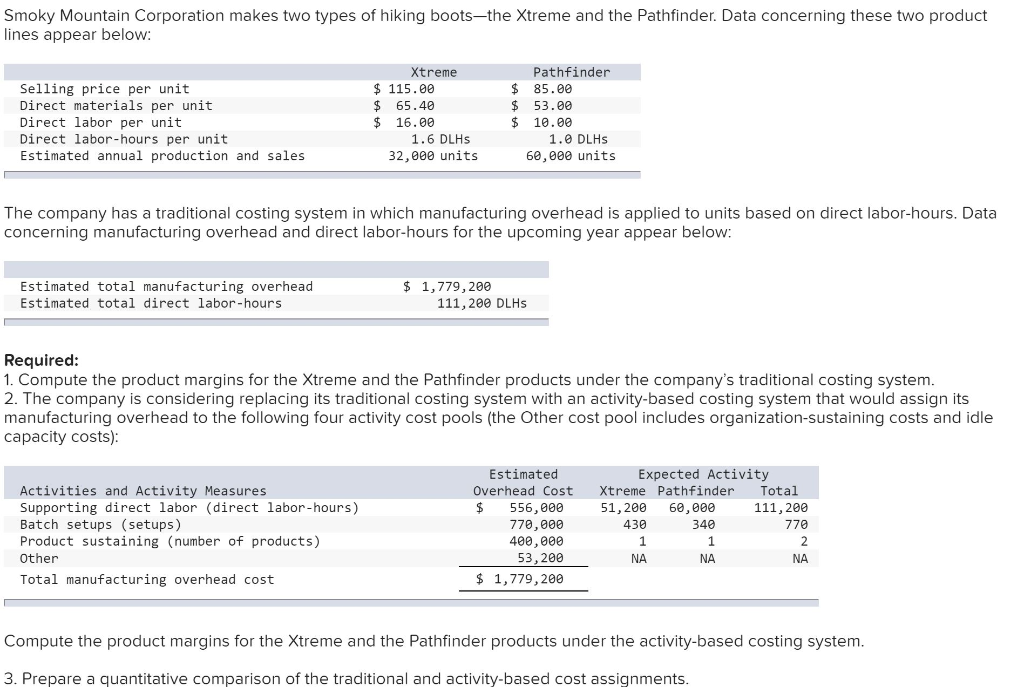
Smoky Mountain Corporation makes two types of hiking boots-the Xtreme and the Pathfinder. Data concerning these two product lines appear below: Selling price per unit Direct materials per unit Direct labor per unit Direct labor-hours per unit Estimated annual production and sales Xtreme $ 115.00 $ 65.40 $ 16.00 1.6 DLHS 32,000 units Pathfinder $ 85.00 $ 53.00 $ 10.00 1.0 DLHS 60,000 units The company has a traditional costing system in which manufacturing overhead is applied to units based on direct labor-hours. Data concerning manufacturing overhead and direct labor-hours for the upcoming year appear below: Estimated total manufacturing overhead Estimated total direct labor-hours $ 1,779,200 111,200 DLHS Required: 1. Compute the product margins for the Xtreme and the Pathfinder products under the company's traditional costing system. 2. The company is considering replacing its traditional costing system with an activity-based costing system that would assign its manufacturing overhead to the following four activity cost pools (the Other cost pool includes organization-sustaining costs and idle capacity costs): Activities and Activity Measures Supporting direct labor (direct labor-hours) Batch setups (setups) Product sustaining (number of products) Other Total manufacturing overhead cost Estimated Overhead Cost $ 556,000 770,000 400,000 53,200 $ 1,779,200 Expected Activity Xtreme Pathfinder Total 51,200 60,000 111,200 430 340 770 1 1 2 NA NA NA Compute the product margins for the Xtreme and the Pathfinder products under the activity-based costing system. 3. Prepare a quantitative comparison of the traditional and activity-based cost assignments. Smoky Mountain Corporation makes two types of hiking boots-the Xtreme and the Pathfinder. Data concerning these two product lines appear below: Selling price per unit Direct materials per unit Direct labor per unit Direct labor-hours per unit Estimated annual production and sales Xtreme $ 115.00 $ 65.40 $ 16.00 1.6 DLHS 32,000 units Pathfinder $ 85.00 $ 53.00 $ 10.00 1.0 DLHS 60,000 units The company has a traditional costing system in which manufacturing overhead is applied to units based on direct labor-hours. Data concerning manufacturing overhead and direct labor-hours for the upcoming year appear below: Estimated total manufacturing overhead Estimated total direct labor-hours $ 1,779,200 111,200 DLHS Required: 1. Compute the product margins for the Xtreme and the Pathfinder products under the company's traditional costing system. 2. The company is considering replacing its traditional costing system with an activity-based costing system that would assign its manufacturing overhead to the following four activity cost pools (the Other cost pool includes organization-sustaining costs and idle capacity costs): Activities and Activity Measures Supporting direct labor (direct labor-hours) Batch setups (setups) Product sustaining (number of products) Other Total manufacturing overhead cost Estimated Overhead Cost $ 556,000 770,000 400,000 53,200 $ 1,779,200 Expected Activity Xtreme Pathfinder Total 51,200 60,000 111,200 430 340 770 1 1 2 NA NA NA Compute the product margins for the Xtreme and the Pathfinder products under the activity-based costing system. 3. Prepare a quantitative comparison of the traditional and activity-based cost assignments







